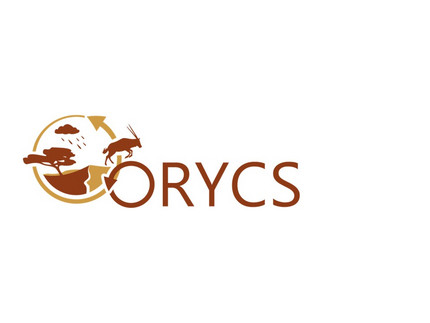ORYCS
The overarching key objective of ORYCS is to provide the first, urgently needed, scientifically rigorous assessment of wildlife-based land use options in Namibian savannas that can be extrapolated to similar savanna systems worldwide. In ORYCS we use the traditional definition of wildlife i.e. large, wide-ranging and undomesticated animal species. We specifically focus on endemic large herbivores with different feeding patterns (Mountain zebra, Plains zebra, Kudu, Oryx and Eland antelopes) and human-wildlife conflict species (elephants and large predators such as lions and leopards) that have a high intrinsic value and are vital to Namibian savannas. By understanding and aiming to improve wildlife-based management options, ORYCS contributes to better protect all other biodiversity of plants and smaller animal species that shelter under the canopy of selected wildlife.
Projects
ORYCS is structured in six workpackages (WP1-6). WP1 is the overarching workpackage and coordinates ORYCS. WPs are centered on the main scientific tasks of the project and interlinked to each other in several ways reflecting the interdisciplinary approach of the project (see respective sections 5 in WP descriptions in part II).
The project coordination (in WP1) will be based at the University of Potsdam (Jeltsch, Blaum). On the Namibian side, project coordination of field work will be supported by NUST (Hauptfleisch), while the technical coordination of workshops and the education & exchange program will be supported by UNAM (Wanke). Transparency of decision-making is the foundation of ORYCS project management and will be achieved by (i) making fundamental decisions within a steering committee consisting of all workpackage leaders and (ii) by having a German-Namibian co-lead for each workpackage. Further, the project will start with a kick-off and initial stakeholder workshop including all project partners members, followed by annual workshops and a final conference with a stakeholder outreach workshop. Continuous evaluation of project progress by WP1 will assure successful achievement of milestones (see workpackage description for details) and facilitate synergistic cooperation between workpackages.
Publications
Published (Peer reviewed)
2023
Irob K, Blaum N, Weiss-Aparicio A, Hauptfleisch M, Hering R, Uiseb K & Tietjen B (2023). Savanna resilience to droughts increases with the proportion of browsing wild herbivores and plant functional diversity. Journal of Applied Ecology. 00:1–12. doi: 10.1111/1365-2664.14351
Luetkemeier R, Kraus R, Mbidzo M, Hauptfleisch M, Liehr S, Blaum N (accepted). A qualitative exploration of conflicts in human-wildlife inter-actions in Namibia’s Kunene Region. MDPI Diversity.
2022
Broekman MJ et al., Blaum N et al., Hauptfleisch M, Hering R et al., Jeltsch F et al. & Tucker M (2022). Evaluating expert-based habitat suitability information of terrestrial mammals with GPS-tracking data. Global Ecology and Biogeography. 31(8):1526-1541. doi: 10.1111/geb.13523
Atmani F, Bookhagen B, Smith TT (2022). Measuring Vegetation Heights and Their Seasonal Changes in the Western Namibian Savanna Using Spaceborne Lidars. Remote Sensing. doi: 10.3390/rs14215427
Hering R, Hauptfleisch M, Jago M, Smith TT, Kramer-Schadt S, Stiegler J, Blaum N (2022). Don't stop me now: Managed fence gaps could allow migratory ungulates to track dynamic resources and reduce fence related energy loss. Frontiers in Ecology and Evolution. doi: 10.3389/fevo.2022.907079
Hering R, Hauptfleisch M, Kramer-Schadt S, Stiegler J, Blaum N (2022). Effects of fences and fence gaps on the movement behavior of three southern African antelope species. Frontiers in Conservation Science. 3: 959423. doi: 10.3389/fcosc.2022.959423.
Maestre FT et al., Blaum N et al., Jeltsch F et al., Gross N (2022). Grazing and ecosystem service delivery in global drylands. Science. 378(6622):915-920. doi: 10.1126/science.abq4062
Reinhard J, Geissler K & Blaum N (2022). Grass and ground dwelling beetle community responses to holistic and wildlife grazing management using a cross-fence comparison in Western Kalahari rangeland, Namibia. Journal of Insect Conservation. 26: 711-720. doi: 10.1007/s10841-022-00410-6
Szangolies L, Lohmann D, Hauptfleisch M, Jeltsch F (accepted). Balanced functional herbivore composition stabilizes tree-grass coexistence and productivity in a simulated savanna rangeland ecosystem. Journal of Rangeland Ecology & Management (Revision after invited resubmission).
Berry PE, Dammhahn M & Blaum N (accepted). Keeping cool on hot days: Activity responses of African antelope to heat extremes. Frontiers in Ecology and Evolution.
Irob K, Blaum N, Baldauf S, Kerger L, Strohbach B, Kanduvarisa A, Lohmann D & Tietjen B (2022). Browsing herbivores improve the state and functioning of savannas: A model assessment of alternative land use strategies. Ecology and Evolution. 12:e8715. doi: 10.1002/ece3.8715
2021
Luetkemeier R, Mbidzo M, Liehr S (2021). Water security and rangeland sustainability: Transdisciplinary research insights from Namibian-German collaborations. South African Journal of Science. 117(1/2). doi:10.17159/sajs.2021/7773
Lütkemeier R, Kraus R, Mbidzo M, Hauptfleisch M, Liehr L (2021). Stakeholder attitudes towards wildlife-based land use in Namibia’s Kunene Region. Joint XXIV International Grassland Congress and XI International Rangeland Congress (IGC-IRC2021). Proceedings. Nairobi, Kenya. Full Paper
2020
Fickel T, Lütkemeier R, Hummel D (2020). Biodiversitätskonflikte. Eine sozial-ökologische Perspektive. W & F Wissenschaft und Frieden. 38(4): 26-29.
Book chapters (Springer SPACES Book Project)
In Press
Hauptfleisch M, Blaum N, Liehr S, Hering R, Kraus R, Tausendfreund M, Cimenti A, Lüdtke D, Rauchecker M, Uiseb K (In Press). Trends and barriers to wildlife-based options for sustainable management of savanna resources – the Namibian case. In: Sustainability of Southern African Ecosystems under Global Change: Science for Management and Policy Interventions. (Eds.) Graham von Maltitz, Guy F. Midgley, Jennifer Veitch, Christian Brümmer, Reimund Rötter, Finn Viehberg, Maik Veste. Springer.
Luetkemeier R, Bieri M, Kraus R, Mbidzo M, Midgley G (in press). Lessons Learned from a NorthSouth Science Partnership for Sustainable Development. In: G. von Maltitz et al. (Eds.) Sustainability of southern African ecosystems under global change: Science for management and policy interventions. Springer.
2022
Geissler K, Blaum N, von Maltitz GP, Smith T, Bookhagen B, Wanke H, Hipondoka M, Hamunyelae E, Lohmann D, Lüdtke DU, Mbidzo M, Rauchecker M, Hering R, Irob K, Tietjen B, Marquart A, Skhosana FV, Herkenrath T, Uugulu S (2022). Biodiversity and ecosystem functions in Southern African savanna rangelands: threats, impacts and solutions. In: von Maltitz G, Midgley GF, Veitch J, Brümmer C, Rötte R, Viehberg F, Veste M (eds). Sustainability of Southern African Ecosystems under Global Change, Ecological Studies, Vol 248. Springer Cham.


